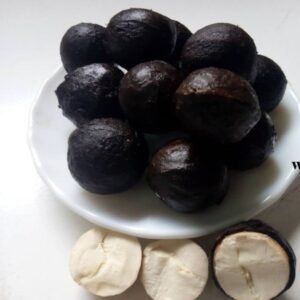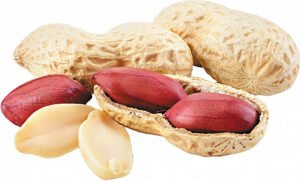Top 5 healthy nuts to eat for better health in Nigeria
Nourishing your body with the goodness of nuts isn’t just a treat for your taste buds—it’s a health investment. Packed with a powerhouse of nutrients like unsaturated fats, protein, and fiber, nuts offer a symphony of benefits from weight management to heart health. According to nutrition experts, regular nut consumption can even boost gut health, adding an exciting dimension to their nutritional profile. But not all nuts are created equal, each boasting its unique set of advantages. Whether you’re a fan of the complete protein package of pistachios or the vitamin E richness of almonds, these top 5 nuts stand out for their nutritional prowess.
In this article we will explore the origins and benefits of 5 amazing healthy nuts that have become more than just culinary delights; they’re a testament to the resilience and versatility of African agriculture. From the sweet allure of walnuts to the nutrient-packed goodness of almonds, and the local hero status of peanuts, to the creamy treasures of cashews and the nutty traditions of Bambara groundnuts – each nut tells a story of adaptation and significance in the agricultural history of Nigeria and beyond.
Walnuts

Walnut (nigeria walnut)
Originally from Persia, walnuts have an agricultural history that dates back thousands of years. Traded along the Silk Road, they eventually found their way to various parts of the world, including Africa. In Nigeria, the cultivation of walnuts has adapted to the tropical climate, making them a unique addition to the agricultural landscape. It popularity is growing, especially amongst health-conscious people. Imported varieties are also making their way to local markets, bringing the benefits to our tables.
Walnuts have culinary versatility, often featured in both sweet and savory dishes. Beyond their delicious flavor, they are rich in omega-3 fatty acids and antioxidants, contributing to heart health. Walnut oil is prized in cooking and salads, adding a nutty richness. Ground walnuts make a delightful addition to baked goods and desserts. In traditional medicine, walnuts are associated with improved cognitive function, adding another layer to their significance.
Nutritional Values:
- Packed with omega-3 fatty acids, walnuts are your brain’s best friend.
- Rich in antioxidants, they help fight inflammation and support heart health.
- A good source of protein, fiber, and essential minerals.
Health Benefits:
- Boosts cognitive function and improves memory.
- Supports heart health by lowering cholesterol levels.
- Helps manage stress with its mood-enhancing properties.
Almonds

Almonds
Almonds have an ancient history, originating in the Middle East and spreading across the Mediterranean. Their journey to Africa is marked by trade routes and exploration. In Nigeria, almonds are now cultivated, However, they require specific environmental conditions such as well-drained soil, warm temperatures, and a dry climate. It is now contributing to the agricultural diversity of the region.
Almonds are prized for their nutritional value, being a source of healthy fats, protein, and essential nutrients. They are consumed as snacks, added to dishes, and used to produce almond milk which is gaining popularity as a dairy-free alternative. Almond flour is a gluten-free alternative for baking, while almond butter is also a delicious spread and a healthier alternative to some conventional spreads. In traditional medicine, almonds are associated with various health benefits, contributing to their significance.
Nutritional Values:
- High in vitamin E, magnesium, and fiber, almonds are a nutrient powerhouse.
- Packed with healthy monounsaturated fats and protein.
Health Benefits:
- Boosts heart health by reducing bad cholesterol.
- Supports weight management with its satisfying protein and fiber content.
- Enhances skin health with its vitamin E content.
Peanuts

Peanuts (groundnut)
Peanuts, or groundnuts, are native to South America and were introduced to Africa during the Columbian Exchange. They quickly became a staple in African agriculture. In Nigeria, peanuts have a deep-rooted history, symbolizing sustenance and versatility in local diets. Step into any Nigerian market, and the aroma of roasted peanuts fills the air. Peanuts, or groundnuts as it is popularly called, have been a local hero for centuries.
A staple in Nigerian snacks like chin-chin and suya. From crunchy street snacks to suya spice, roasted, boiled, or ground into paste, peanuts have woven themselves into the very fabric of Nigerian culture. Peanuts are also used in traditional dishes, adding flavor, texture, and nutritional value. The oil extracted from peanuts is a significant culinary ingredient. Peanut oil is widely used in cooking, making stews and frying. Peanut butter is also a beloved spread.
Nutritional Values:
- A great source of plant-based protein, peanuts are energy-packed.
- Rich in monounsaturated fats, niacin, and folate.
Health Benefits:
- Supports heart health by improving cholesterol levels.
- Aids in weight management by providing a feeling of fullness.
- Packed with antioxidants, contributing to overall well-being.
Cashews

Cashew nut
Originating in Northeastern Brazil, cashews made their way to Africa via Portuguese explorers. Nigeria’s coastal regions provide an ideal environment for cashew cultivation. The sandy soils and tropical climate create the perfect conditions for cashew trees to flourish. The cashew tree’s dual yield of nuts and cashew apples contributes to its importance in agriculture.
Cashews are a culinary delight, enjoyed as snacks or incorporated into dishes. Cashew nuts are an essential ingredient in local delicacies like banga soup. The cashew apple, though less popular than its nuts, is used in beverages and jams. Cashew nuts are a rich source of healthy fats and minerals. Beyond culinary uses, cashews play a role in traditional medicine. It is also a delightful addition to salads, and desserts.
Nutritional Values:
- Cashews are rich in healthy monounsaturated fats, copper, and iron.
- A good source of protein, fiber, and essential minerals.
Health Benefits:
- Supports heart health by promoting good cholesterol.
- Boosts immune function with its copper content.
- Enhances skin health and wound healing with its zinc content.
Bambara Groundnut

Bambara nut
Bambara groundnuts are indigenous to West Africa and have been a traditional crop for centuries. They are hardy and well-suited to arid conditions. The Bambara groundnut thrives particularly in the northern regions of Nigeria, contributing to their local agriculture. Bambara groundnuts are a staple in African diets, particularly in Nigeria. They are a key ingredient in local dishes like kunu, mosa, okpa, and are used in making porridge, soups, and snacks. The Bambara groundnut plays a vital role in traditional Nigerian dishes. Rich in protein and other nutrients, they contribute to food security. Additionally, their cultivation helps improve soil fertility, showcasing their value beyond the kitchen.
Nutritional Values:
- Bambara groundnuts are rich in protein, fiber, and essential minerals.
- A good source of antioxidants and healthy fats.
Health Benefits:
- Supports digestive health with its fiber content.
- Provides sustained energy with a good balance of protein and complex carbohydrates.
- Rich in antioxidants, contributing to overall well-being.
There you have it, 5 wonderful nuts that pack a punch not just in flavor but in health benefits too. Whether you’re tossing them in salads, blending them into smoothies, or munching them straight from the bag, these nuts are your passport to a healthier, happier you. So, go nuts and snack your way to better health.

